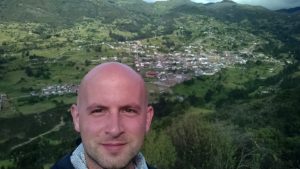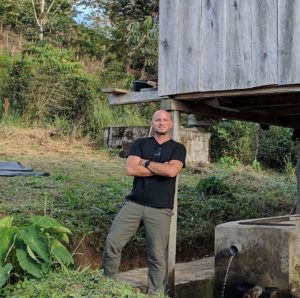It was drizzling, of course, when UMW alum Robert Durrette ’09 poured two cups of coffee at his rainforest lodge.
 He handed one to the Honduran guard he paid to watch over the place. As cool drops tapped on the rippled tin roof, the guard shared his family’s struggle to make a living on their coffee farm … and a plan for the future began to brew.
He handed one to the Honduran guard he paid to watch over the place. As cool drops tapped on the rippled tin roof, the guard shared his family’s struggle to make a living on their coffee farm … and a plan for the future began to brew.
“These people are working their butts off,” Durrette said of the Central and South American farmers with whom he’s chosen to partner. “They’re hauling 100-pound bags of coffee on their shoulders two hours down a mountainside and earning one percent of the final cost of a cup of coffee in a café. I don’t think that’s OK.”
He had a similar mindset at Mary Washington, when he first traveled to Honduras to help orphaned and abandoned children. The trip was to have been a once-in-a-college-career kind of thing, but the impoverished country kept calling him back. A decade later, Durrette’s rainforest lodge and microbrewery is a top-rated tourist spot in Central America, and his new venture – Farmers First Coffee Company – is poised to help farmers work their way out of poverty.
Fresh out of high school in Urbanna, Virginia, Durrette came to Mary Washington because it was “what I envisioned a college campus should look like,” he said. He majored in international affairs, absorbing the wisdom of the department’s professors like Robert Barr, Rosalyn Cooperman and Elizabeth Larus, as well as Professor of Economics Shawn Humphrey and others.
 Durrette was a sophomore when he heard Shin Fujiyama ’07, co-founder of the UMW-born humanitarian group Students Helping Honduras (SHH), speak about politics in developing countries. Then, on a road trip to Richmond, classmate Justin Simeone ’08 “would not stop talking about SHH,” Durrette said. “He really piqued my interest.”
Durrette was a sophomore when he heard Shin Fujiyama ’07, co-founder of the UMW-born humanitarian group Students Helping Honduras (SHH), speak about politics in developing countries. Then, on a road trip to Richmond, classmate Justin Simeone ’08 “would not stop talking about SHH,” Durrette said. “He really piqued my interest.”
Durrette joined the nonprofit, traveling three times to Honduras before graduation. Then he moved there to lead communication efforts for the group while it experienced incredible growth. The influx of aid was heartwarming but with magnificent mountains, beaches and waterfalls, he thought, Honduras should be hosting vacationers, too.
When he learned that a lodge he’d frequented with friends was for sale, “The gears started turning and I was like a dog with a bone,” Durrette said of his passion for the place on the coffee-rich soil of the Los Naranjos village, near Lake Yojoa and national parks, far from the dusty roads and smoldering trash of the city. “I had this gut feeling.”
He scraped up funds and took out loans to buy D&D Brewery, Lodge and Restaurant, and spent months refurbishing it. The hard work paid off in 2013, when top travel guide Lonely Planet named the lodge the best place to stay in Honduras. Overnight, business doubled.
“I’m not surprised that Bobby has been successful in a difficult business environment such as Honduras, where the bureaucracy can kill the best of ideas,” said Professor of Spanish Jose Sainz, who directs UMW’s Center for International Studies. “As a student, he showed the hard work, passion and determination that have made him the entrepreneur he is today.”
From the patrons at Durrette’s lodge, including Matt Hohler, who would become his business partner, and his 100-percent Honduran staff, including the guard who shared his family’s struggle that drizzly night, came the next big idea: Farmers First Coffee.
The company aims to level inequality in the coffee market. It straddles direct- and fair-trade business models, pruning both risk and the middlemen who eat up profits, and putting more money – as much as four times more than traditional programs – in farmers’ pockets. By switching between growing seasons in Honduras and Peru, Durrette plans to grind out high-quality coffee delivered year-round to customers’ doors.
The project raised more than $52,000 in start-up funds when it debuted this summer on the online public-benefit platform Kickstarter. Durrette plans to team up with farmers in need, including Daniel and Rosa, the first of hundreds of partners he hopes to help.
“As we grow, the people who are providing us with the product are going to be growing too,” he said. “I’m extremely proud of that.”
He’s proud, too, of his time at Mary Washington, where he learned to think critically, solve problems and face down injustice … and where he found promise in a struggling country.
“I would not be where I am right now if I hadn’t gone to Honduras,” Durrette said. “I wouldn’t have gone to Honduras if I hadn’t joined SHH, and I wouldn’t have joined SHH if I hadn’t been at UMW.”